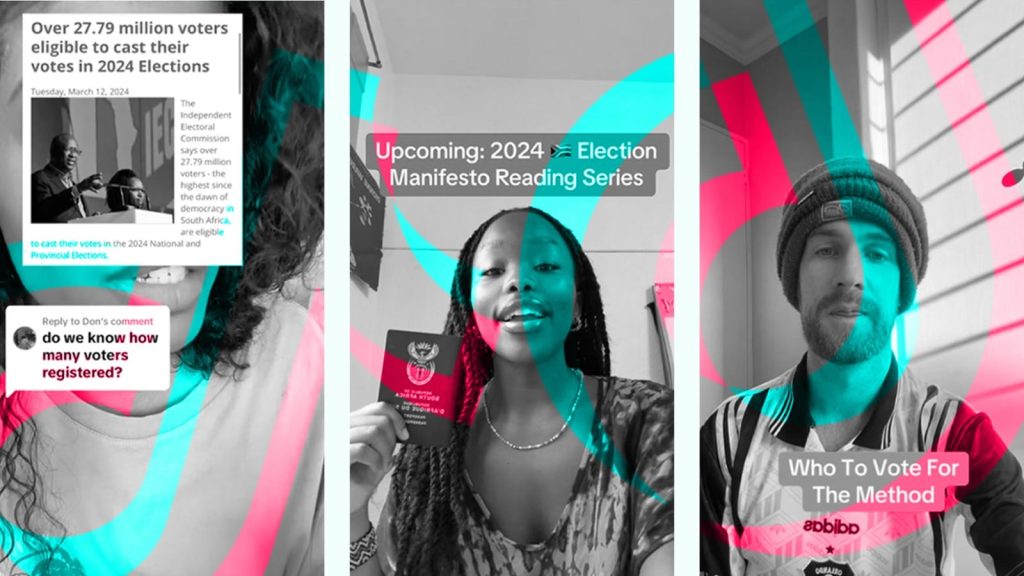Amahle Gebane first started posting on TikTok in August 2022. Initially, the South African activist’s videos included commentary on social issues like financial inequality and xenophobia. She had some followers, but her audience was not significantly large.
In 2023, Gebane had a breakthrough when she posted a video series discussing her political views. The series went viral and her following started growing rapidly.
“I got into politics when I was just observing the political conversations my family had,” Gebane, who currently has over 161,000 followers on TikTok, told Rest of World. “I felt that there was an education gap and it was a bit difficult for me to accept the lack of knowledge within the youth.”
For the past year, Gebane’s TikTok content has been focused on convincing young South Africans to participate in the country’s general elections, which took place on May 29. In 2019, the turnout for young voters in South Africa had been low: Only 15% of eligible voters aged 18–19 years and 30% of those aged 20–29 years cast a ballot.

@amahle.gebane
Gebane is one of several young political influencers in South Africa who have been using TikTok to persuade young voters to participate in the elections this year. Given the popularity of the social media platform in the country, experts believe this trend could have a significant impact on the outcome of the election.
“Looking at the voter population … a large chunk of voters are the youth, and this is the very age group which is active on social media,” Edwin Yingi, a postdoctoral research fellow in the University of South Africa’s political science department, told Rest of World. “The political parties have gone out of their way to try and reach these age groups, so we cannot count social media out in this election. It’s going to have a huge impact.”
Social media has had a widespread influence on the political landscape, businesses, and pop culture of South Africa over the past decade, Pedro Mzileni, senior lecturer in sociology at the University of Zululand, said in an opinion piece for Mail & Guardian earlier this month. “Most organizations, movements, businesses, and individuals have an account with followers on Facebook, WhatsApp, YouTube, Instagram, TikTok, and WeChat. As a result, political parties in recent times have also realized the importance and influence of social media,” Mzileni wrote.
By 2023, TikTok had 11.83 million South African users above the voting age of 18 years. It is the most popular short-form video app in the country, miles ahead of Instagram which has just 5.65 million users in South Africa, according to data from analytics firm Meltwater.
One way that influencers are encouraging young South Africans to vote is by reminding them to register for the ballot well ahead of time. A year before the elections, Zethu Gqola, a TikTok creator with over 275,000 followers, added the voter registration link to her bio and reminded viewers to click on it at the end of every video. “That became a call to action versus complaining with no solution,” she said on a podcast last month. Gqola said her efforts have led some 28,500 people to register to vote ahead of this year’s election.
Some South African TikTok influencers have garnered such a strong following that they are attracting the attention of political parties.

@darrencampher.com
In a podcast in January, Dan Corder, who has 212,400 followers on TikTok, said he had been approached by two political parties to assume a parliamentary role, citing his significant following.
“I think this is the first time in South Africa’s history that certain content creators online have the power to change the futures of individual politicians,” Corder said on another podcast. “Online creators in South Africa have now got such significant audiences … that they can interact with politics and create such viral moments that they will impact people’s perceptions in the way that a TV interview can also do.”
As one of more than 50 countries holding elections this year, the effect of TikTok on the political landscape is not unique to South Africa. In the U.S., President Joe Biden capitalized on the app’s reach by hosting a White House event for prominent influencers, which included Devon Rodriguez, a TikToker with nearly 34 million followers. “Your influence is overwhelming,” remarked Biden to Rodriguez, who had 20 million followers at the time. The video of the visit is one of the most popular on his channel.
There are limitations, however, to the power of social media when it comes to creating the change needed in South African politics, Tessa Dooms, director of programs at Rivonia Circle, a political think tank, told Rest of World.
“The majority of South African young people can’t afford to be on social media and we overlook that when we think about who is there and who is represented — whether it’s TikTok or Twitter, [or] even increasingly on Facebook,” she said. “We don’t consider the resource-poor communities.”
This article was originally published by a restofworld.org . Read the Original article here. .


